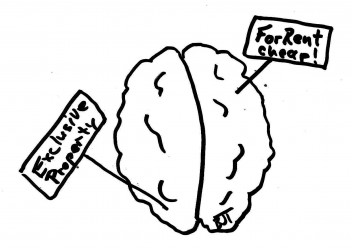 Marketers have always been reliant on psychology for underlying theories about how perceptions shape behavior. But the field of psychology has often been a wobbly foundation for brand strategists and psychological theory is not always greeted as real science in the boardroom. Perhaps it’s because psychology is full of competing theories on most topics, which makes its credibility a bit shaky when you are trying to convince hard-nosed business types about a brand model based on one of those theories. It’s just too “squishy.”
Marketers have always been reliant on psychology for underlying theories about how perceptions shape behavior. But the field of psychology has often been a wobbly foundation for brand strategists and psychological theory is not always greeted as real science in the boardroom. Perhaps it’s because psychology is full of competing theories on most topics, which makes its credibility a bit shaky when you are trying to convince hard-nosed business types about a brand model based on one of those theories. It’s just too “squishy.”
Thankfully, we now have another resource to inform brand theory and marketing. Neuroscience provides a treasure trove of new understanding about how the brain works, how decisions are made and even the best place for a brand to (literally) live in the brain. Where we used to euphemistically refer to the battle for real estate in the minds of consumers, now we are learning that there really is more valuable real estate in which to land your brand inside a consumer’s brain. We can take this learning and focus the type of brand strategy we use to make sure it is working on the parts of the brain where the strongest bonds can be formed.
Daniel Pink has obviously written about this in the recent past, as have others, but we like Giep Franzen who was a pioneer in applying brain science to advertising and brand thinking. Also, Antonio Damasio, who runs USC’s Brain & Creativity Center has provided some great insights for brand strategists.
The theoretical basis for brand strategy is much better for all this new insight, but just as importantly, we find that referencing brain scientists who scan the brain in functional MRIs is far more solid ground for brand theory than psychology ever was — especially when you are trying to sell an idea in the boardroom. For some reason, it seems more concrete … more Scientific. We presented to a group of senior leaders at an engineering-driven company recently and it was amazing to see the difference in response to our arguments when we cited neuroscience. It kind of works like all those commercials with an actor in a white doctor’s coat I guess.
This is not to say that we don’t respect the work of psychologists, and behavioral economics is also enormously helpful to brand strategists. For instance, we credit psychologist Robert Zajonc’s work for much of our thinking about the systematic problems with certain testing methodologies. But there is no doubt that we stand on more solid ground when we can reference brain science in the real world of business decision-making.


I love how the discoveries that are coming out of the field of neuroscience are requiring us to reshape our understanding about how we make decisions and the fact that we might not be as cognizant of our decision-making skills as we think.
Jonah Lehrer has a nice blogpost about the frontal cortex role when making aesthetic judgements. http://www.wired.com/wiredscience/frontal-cortex/
In one experiment subjects taste tested Cabernet Sauvignons inside an fMRI machine. In another subjects looked at Rembrandts – also in a fMRI. He concludes “We want to believe that pleasure is simple, that our delight in a fine painting or bottle of wine is due entirely to the thing itself. But that’s not the way reality works. Whenever we experience anything, that experience is shaped by factors and beliefs that are not visible on the canvas or present in the glass.”